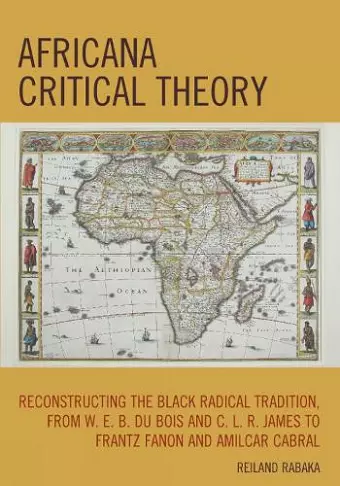Africana Critical Theory
Reconstructing The Black Radical Tradition, From W. E. B. Du Bois and C. L. R. James to Frantz Fanon and Amilcar Cabral
Format:Hardback
Publisher:Lexington Books
Published:16th Jan '09
Currently unavailable, and unfortunately no date known when it will be back
This hardback is available in another edition too:
- Paperback£61.00(9780739128862)

Building on and going far beyond W.E.B. Du Bois and the Problems of the Twenty-First Century and Du Bois's Dialectics, Reiland Rabaka's Africana Critical Theory innovatively identifies and analyzes continental and diasporan African contributions to classical and contemporary critical theory. This book represents a climatic critical theoretical clincher that cogently demonstrates how Du Bois's rarely discussed dialectical thought, interdisciplinarity, intellectual history-making radical political activism, and world-historical multiple liberation movement leadership helped to inaugurate a distinct Africana tradition of critical theory. With chapters on W.E.B. Du Bois, C.L.R. James, Negritude (Aime Cesaire and Leopold Senghor), Frantz Fanon and Amilcar Cabral, Africana Critical Theory endeavors to accessibly offer contemporary critical theorists an intellectual archaeology of the Africana tradition of critical theory and a much-needed dialectical deconstruction and reconstruction of black radical politics. These six seminal figures' collective thought and texts clearly cuts across several disciplines and, therefore, closes the chasm between Africana Studies and critical theory, constantly demanding that intellectuals not simply think deep thoughts, develop new theories, and theoretically support radical politics, but be and constantly become political activists, social organizers and cultural workers - that is, folk the Italian critical theorist Antonio Gramsci referred to as "organic intellectuals." In this sense, then, the series of studies gathered in Africana Critical Theory contribute not only to African Studies, African American Studies, Caribbean Studies, Cultural Studies, Gender Studies, and Postcolonial Studies, but also to contemporary critical theoretical discourse across an amazingly wide-range of "traditional" disciplines, and radical political activism outside of (and, in many instances, absolutely against) Europe's ivory towers and the absurdities of the American acade
The strengths of this book revolve around Rabaka’s intimate understanding, brilliant critical analysis, and clear articulation of these complicated works, especially in his treatment of the Negritude thinkers. Rabaka clearly articulates his points in this book which leaves the reader with a solid understanding of these Africana theorists, their weaknesses, and how they contributed to Africana critical theory. ... In conclusion, Africana Critical Theory is an excellent intellectual guide and call to action to any academic serious about articulating/critiquing social inequalities and enacting social change. Reiland Rabaka’s work weaves together and critically engages figures central to Africana studies to formulate a radical theoretical and political praxis entitled Africana critical theory. * Journal Of African American Studies *
Africana Critical Theory offers a sweeping attempt to read the Africana tradition into critical theory. The book is accessibly written, and offers a useful teaching tool. -- David Theo Goldberg, Director, Humanities Research Institute, University of California
ISBN: 9780739128855
Dimensions: 267mm x 187mm x 33mm
Weight: 1123g
452 pages